In 1364 BC, Amenhotep IV ascended the throne of the Egyptian pharaoh, called himself Akhenaten, depopulated the heavens of the gods, devised the first monotheistic religion in the world (as far as one believes to know), made many priests and officials unemployed and invented on the side a personality cult, which among other things led to the fact that one can visit the famous bust of Nefertiti, Akhenaten’s wife, in Berlin. Akhenaten worshiped the sun, leaving behind a poetic “song of the sun”, but after his death and with his successor Tutankhamun, the old gods returned to their ancestral places. Philip Glass made an opera from this slightly older material, which premiered in Stuttgart in 1984. Its title: “Echnaton”. Or “Akhnaten”, which means the same thing and is now used by the Opera Incognita company as a title for their production.
Andreas Wiedermann, the troupe’s head of scenography, has done many great opera productions in places where you wouldn’t expect opera performances. The State Museum of Egyptian Art is almost conservative by its standards, but the content is of course mandatory, even if the games are not played between the exhibits, but in the concrete bunker of the event room in the basement. In this, Wiedermann has already done Verdi’s “Aida” before, and there is enough room for the chorus. And there is a lot of choir here, 35 women and men, plus a few soloists, a really astonishing abundance for a free opera company.
However, Glass’s opera only became possible for the Opera Incognita because a version for four synthesizers and three percussionists, authorized by the composer, exists. In fact, it even has a big advantage: Glass has measured all of its musical parameters precisely and also writes them down exactly. It’s not about interpretative individuality here, but rather the precise implementation of a construction plan, including the timbres, which are now generated electronically. The keyboards work fabulously well, and under the direction of Ernst Bartmann, the music develops a crazy pull together with the ancient Egyptian, high-precision choral singing.
The opera consists of individual tableaus, which Wiedermann courageously fills with our present and future, with the over-emotional choir, also with some whispering eccentricities and the three great soloists, the virile counter Kiuk Kim (Akhnaton), Carolin Ritter (Nefertiti) and Dilay Girgin (Akhenaten’s mother). Some things are crude and redundant, but: It is always a (far too rare) experience (Performances until September 16th).

